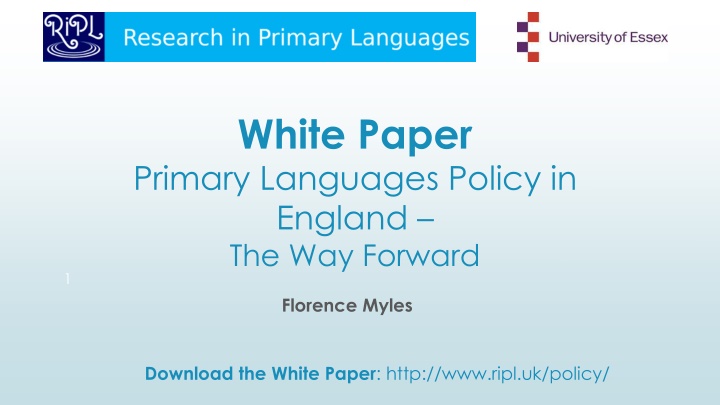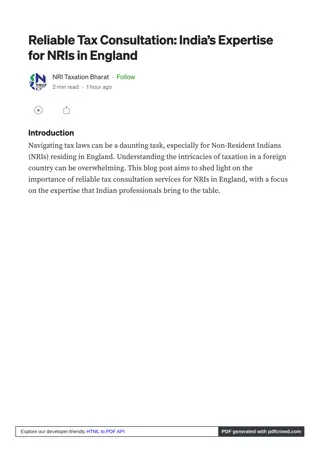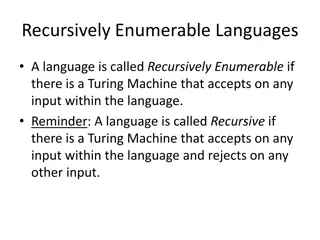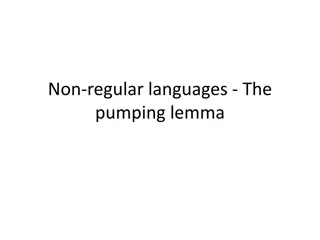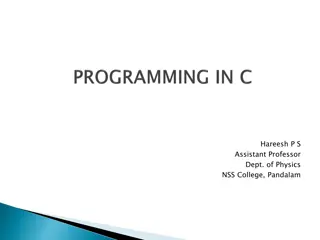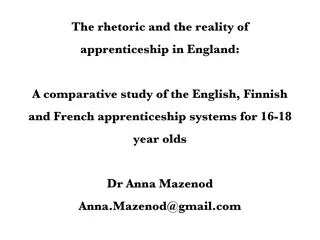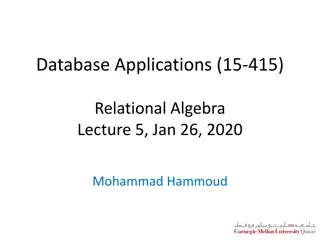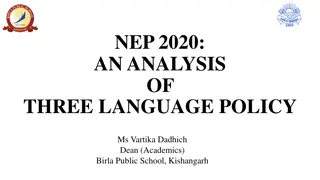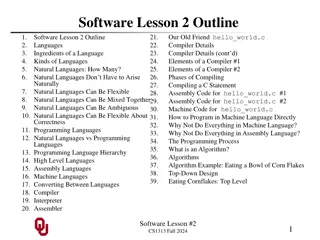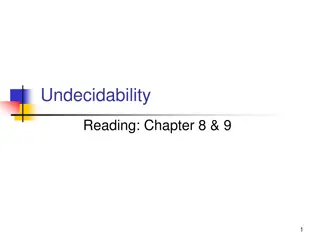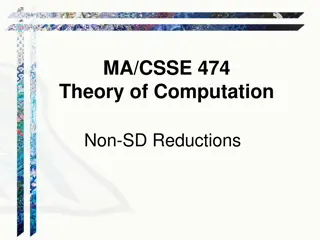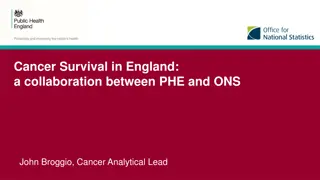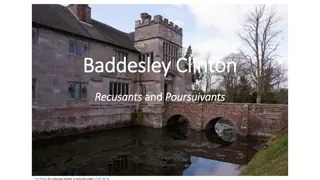Primary Languages Policy in England: The Way Forward
National Curriculum Reform in 2013 introduced the statutory requirement for primary schools to teach a foreign language to all children at KS2, focusing on substantial progress in one language. Five years later, in September 2018, the first cohort of KS2 language learners transitioned to secondary school. The RiPL initiative was set up to evaluate and provide support for language learning in schools by engaging with teachers, researchers, and major stakeholders. In November 2018, the RiPL Policy Summit aimed to discuss current challenges, potential solutions, and develop strategies for effective implementation.
Download Presentation

Please find below an Image/Link to download the presentation.
The content on the website is provided AS IS for your information and personal use only. It may not be sold, licensed, or shared on other websites without obtaining consent from the author.If you encounter any issues during the download, it is possible that the publisher has removed the file from their server.
You are allowed to download the files provided on this website for personal or commercial use, subject to the condition that they are used lawfully. All files are the property of their respective owners.
The content on the website is provided AS IS for your information and personal use only. It may not be sold, licensed, or shared on other websites without obtaining consent from the author.
E N D
Presentation Transcript
White Paper Primary Languages Policy in England The Way Forward 1 Florence Myles Download the White Paper: http://www.ripl.uk/policy/
Context National Curriculum Reform in 2013 2 September 2014: statutory requirement for primary schools to teach a foreign language to all children at KS2 Focus on making substantial progress in one language, ancient or modern; High expectations, strong school accountability; KS3 to build on the foundations laid at KS2; System of levels and descriptors removed and not replaced; Minimal oversight; schools left to interpret and implement requirement; Demise of support given by LEAs; no official guidance available e.g. about: Time requirements Expected attainment levels Level of teacher expertise required Availability of CPD
Where are we 5 years later? 3 In Sept 2018, first cohort of KS2 language learners moved to secondary; Time to evaluate/take stock Have expectations been met? What is the situation in schools? A team of researchers, teachers, teacher trainers, language advocates set up RiPL to: Provide jargon-free summaries of research findings to inform policy and practice contribute to evidence-based policy making through engagement with major stakeholders Engage with teachers to support pedagogic innovation and support Website, blog, monthly newsletter
RiPL Policy Summit, November 2018 4 Aims: To bring together major stakeholders: researchers, teachers, school leadership, Ofsted, DfE, British Academy, Academy chains, cultural partners in order to: Discuss current provision, challenges and potential solutions; Agree a confirmatory position; Co-construct a White Paper to develop a strategy for the effective implementation of the primary languages strategy. Funded by a BAAL (British Association for Applied Linguistics) Applying Linguistics grant Policy briefings circulated beforehand; Presentations from major stakeholders.
Input from research 5 Policy decisions need to be based on: research-informed understanding of how primary children learn a new language; the conditions which make it possible for pupils to make progress. Key insights are provided by recent research, with clear implications for practice. During much of middle childhood children learn implicitly and need rich and plentiful input for learning to take place: enough time needs to be allocated to language learning rich and plentiful input Middle childhood is characterised by very active cognitive development: activities need to be enjoyable but should also capitalise on emergent learning strategies and cognitive changes towards the end of middle childhood appropriate activities
6 Strong early L1 literacy skills associated with higher FL attainment: links with L1 literacy and the languages children know and are learning need to be strengthened, for both monolingual and EAL children develop metalinguistic awareness and links to L1 Literacy Progress motivates: ensure clearly planned progression to boost motivation and increase uptake of languages in later years clear progression Central importance of context in which children learn: Teaching time, teacher language proficiency, and teaching approach play a very important role; Increased number of EAL pupils multilingualism of EAL children in the language classroom recognise and draw upon the Research evidence discussed at summit and fed into the White Paper (Holmes & Myles 2019)
RiPL White Paper: purpose 7 Develop an implementation strategy: What needs to happen for the primary languages policy to become effective? Based on sound analysis and evidence, what are possible solutions to the challenges faced by primary schools?
RiPL White Paper: Provision 8 Around 80% of schools allocate between 30 60 minutes per week. 71% find it a major challenge to find sufficient curriculum time to teach a language (Tinsley & Board, 2017); England (2%) is generally below the OECD average (4%) for FL curriculum time (10% in Spain)(OECD - Education at a glance 2014); 1 hour per week of FL instruction (along with other factors) optimises FL outcomes (Graham et al., 2017); Children can, and do, make progress when FLs are consistently taught at KS2 (Cable et al., 2010) RiPL Recommendation: A minimum provision of 1 hour per week throughout the school year for all children.
RiPL White Paper: CPD and upskilling 9 Subject knowledge, pedagogical understanding and teacher confidence underpin outcomes (Graham et al., 2017). Limited training in language pedagogy impacts negatively on learner attitudes and self- efficacy (Mihlajev c Djigunovi , 2009). Language upskilling could contribute to easing primary languages teacher supply/confidence issues although GCSE & below impacts on progress (Graham et al., 2017). 42% of schools have class teachers providing FL, 46% use specialist teachers (often on staff) (Tinsley & Board, 2017). Subject knowledge in ITT and knowledge enhancement CPD should reduce inconsistency of provision and should be DfE funded (Carter, 2015). RiPL Recommendation: Funded opportunities for trainee and in- service teachers to develop: subject knowledge, pedagogical understanding and language proficiency.
RiPL White Paper: Curricular content and outcomes 10 Mismatch between primary and secondary perceptions of competence (Board & Tinsley, 2017:13); Strong L1 literacy skills are associated with higher FL attainment; and possibly working memory which is still developing at this stage (Myles & Mitchell, 2012; Courtney et al., 2017; Porter, 2017); The development of L1 literacy in any language supports the development of metalinguistic awareness and vice versa (Murphy et al., 2014). RiPL Recommendation: Clearly defined KS2 outcomes (and progress) to support transition and reduce inequity. Ensure that increasing mastery of the FL is underpinned by a structured approach to knowledge about languages & links to developing L1 literacy
RiPL White Paper: Transition 11 Only 16% of primary schools take part in network or cluster meetings with secondary schools; Secondary schools take responsibility for teaching languages in 6% of primary schools and provide the scheme of work for a further 2%; A very small proportion of schools say that they collaborate with their secondary schools in developing units of work in languages (2%) or in planning lessons together (1%) (Board & Tinsley, 2017); Secondary teachers often take little or no account of prior learning; many pupils repeat what they have already learned; This leads to demotivation which can result in an early loss of interest and curiosity in language learning; This may be a contributory factor to low uptake of languages at KS4 (Courtney, 2014; Graham et al., 2016). RiPL Recommendation: Support teachers to develop continuity of approach from Y6 to Y7, sharing common expectations of outcomes and/or developing a cross-phase scheme of work.
RiPL White Paper: Leadership 12 Raise awareness of the wider benefits of language learning with SLT (Ayres- Bennett & Carruthers, 2019); Develop understanding and recognition of good practice in Governor training programmes (Ayres-Bennett & Carruthers, 2019). RiPL Recommendation: Schools to develop effective partnerships between senior leadership and governors to strengthen accountability. Raise awareness of the value of language learning amongst school leadership.
Conclusions and recommendations 13 It is clear at the current time that: Children do not receive equal opportunities across schools to learn languages at KS2; Some schools illustrate exemplary practice, but a high quality curriculum is not consistently provided in all schools; Opportunities are limited by the teaching conditions; conditions vary between schools; There are differences in weekly time allocated to primary language teaching; There are differences in how the time is distributed across the year and the key stage; There is significant variation in teachers subject knowledge and language proficiency; There is a lack of professional development opportunities; Curriculum planning rarely involves cross-phase collaboration, scant agreement at local level on what to teach, what pupils should be able to do at the end of KS2; As a result, secondary schools seldom build on the KS2 foundations; Lack of continuity leads to demotivation and can contribute to an early loss of interest. There is a clear need for an implementation strategy, informed by current research findings
RiPL recommendations 14 Informed by specialist research evidence, RiPL makes the following ten recommendations for the DfE,working with professional bodies and lead researchers, where appropriate: 1. Time allocation: one hour per week, a non-statutory minimum of 140 hours over KS2; 2. Primary Languages Pedagogy: the DfE should invest in professional development for primary teachers by providing funded opportunities to strengthen primary language subject knowledge, pedagogical understanding and language proficiency; 3. Curriculum planning: commission non-statutory guidance on minimum core content defining what children should know and be able to do; strengthen links with literacy; 4. Transition: clear primary-secondary collaboration about transition from Year 6 to Year 7; 5. Assessment and reporting: agree and approve a nationally recognised benchmark by the age of transfer from KS2 to KS3, including the development and piloting of an e-folio;
RiPL recommendations 15 6. Digital technology: develop more frequent and effective use of technology; 7. School accountability: Ofsted to include a focus on primary languages, in particular with regard to gathering evidence of intent, implementation and impact related to planning. 8. School leadership: develop effective partnerships between senior leadership and governors to strengthen school accountability; 9. Strategic role of research: The DfE should include a focus on the implementation of primary languages policy in the next round of social research aims, in order to garner high quality evidence to inform policy development and delivery of primary languages at KS2; 10. Create a National Taskforce for Primary Languages (NTPL): set up a National Taskforce for Primary Languages, to address the challenges inherent in fully implementing the statutory order to introduce the learning of modern or ancient language from the age of seven. Primary schools face challenges which are distinct from those facing secondary schools and which must be addressed head on. For full details of all the recommendations, see pp. 15-17 in the White Paper
National Task-Force for Primary Languages 16 The central purpose of the NTPL would be to support school- led improvement in the teaching of languages: Research-informed professional development programmes (ITE and CPD); Up-to-date online information on effective teaching methods; Accessible summaries of research on primary language learning and teaching; Support for the development of strategic learning networks of primary and secondary language teachers; Language up-skilling of primary practitioners; Opportunities to participate in classroom-based interventions to improve the quality of teaching and learning and pupil outcomes; Large scale research (subject to funding) on key priorities in relation to language learning.
White Paper Primary Languages Policy in England The Way Forward With thanks to the British Association for Applied Linguistics (BAAL) for supporting the RiPL Summit and the White Paper. If you have any comments, please send a message to: ripl@ripl.uk 17 https://twitter.com/riplnetwork https://www.facebook.com/theriplnetwork/
RiPL - Research in Primary Languages 18 The Research in Primary Languages (RiPL) network was born out of a series of workshops bringing together researchers and practitioners to address current issues in primary foreign language learning and teaching. A real need was felt for closer dialogue and collaboration, in order to inform policy. www.ripl.uk
